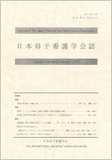Japanese
English
- 有料閲覧
- Abstract 文献概要
- 参考文献 Reference
目的
妊婦とパートナーの妊娠への適応と個人的背景の違いを明らかにすること。
対象と方法
初めて親となる妊娠28週以降のカップルを対象に、妊婦には日本語版Prenatal Self-Evaluation Questionnaire(以下J-PSEQ)を使用し、パートナーはJ-PSEQを改変したパートナー用J-PSEQを用いて自記式質問紙調査を行った。倫理審査委員会の承認を得て実施し、対象者には口頭および紙面で説明した。
結果
妊婦271部、パートナー251部を分析対象とした。妊婦の個人的背景によるJ-PSEQの得点に有意差はなかった。個人的背景によるパートナーの合計得点の差はなかったが、【妻の妊娠の受容】、【妻の出産や赤ちゃんの不安】、【妻の出産の準備】、【父親になることの受容】の因子得点に有意差が確認された。妊婦とパートナーのJ-PSEQの合計得点の差はなかったが、質問項目ごとに有意差が確認できた。
結論
妊娠への適応に影響するパートナーの個人的背景が明らかになった。妊婦とパートナーは同程度適応している一方で、その内容については差があることが明らかになった。
Objective
To identify whether any differences exist in their adaptation to pregnancy between pregnant women and their partners.
Subjects and methods
A self-administered questionnaire survey was given to couples who are 28 weeks or more pregnant with their first child. The pregnant women completed the Japanese version of the Prenatal Self-Evaluation Questionnaires(J-PSEQ), and their partners, a version of the J-PSEQ modified for partner evaluations. The survey was approved before its commencement by the Institutional Research Ethics Committee, and the participants received oral and written explanations.
Results
An analysis was made of 271 responses from the pregnant women, and 251 from the partners. No significant differences resulting from their personal backgrounds were found in the pregnant women's J-PSEQ scores. There were also no differences due to their personal backgrounds in the partners' total scores, but significant differences were found in the scores of the factors: "acceptance of wife's pregnancy," "concerns for well-being of wife and baby in labor," "preparations for wife's labor," and "acceptance of being a father." Although no differences were found in the total J-PSEQ scores between the pregnant women and partners, significant differences were identified in each questionnaire item.
Conclusion
The study revealed the personal backgrounds of partners that affect their adaptation to pregnancy. It became clear that while the pregnant women and partners are similarly adapted to pregnancy, differences exist in the details of their adaptation.
Copyright © 2014, The Japan Maternal and Infant Caring Association All rights reserved.


